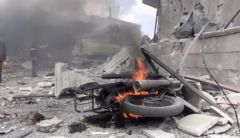Share
Human Rights Voices
While the UN devotes its human rights operations to the demonization of the democratic state of Israel above all others and condemns the United States more often than the vast majority of non-democracies around the world, the voices of real victims around the world must be heard.
Syrian Arab Republic, January 16, 2020
Syrian airstrikes in Idlib leave at least 18 dead despite ceasefire
Original source
At least 18 civilians have been killed in airstrikes as an offensive by Bashar al-Assad's forces presses ahead, burying a supposed ceasefire in Syria's last opposition-held province.
Airstrikes carried out by the Syrian air force and its Russian allies hit a market and industrial zone in Idlib city in a ferocious attack on Wednesday, destroying several buildings and setting cars on fire, leaving the torched corpses of motorists trapped inside.
Children and rescue workers were among the dead, the UK-based monitor the Syrian Observatory for Human Rights (SOHR) said.
Idlib province has been increasingly targeted by bombing in recent weeks after several failed or still-born ceasefires brokered by Russia and Turkey over the past 18 months.
The latest agreement to halt air and ground attacks was supposed to go into effect on 12 January but never materialised.
Government forces are now just 7km from the major rebel town of Maaret al-Numan after heavy clashes on Wednesday night that killed at least 22 rebel fighters, mostly from Hayat Tahrir al-Sham, a former al-Qaida offshoot that has become the dominant militant group in Idlib.
Seventeen government troops and allied fighters were also killed in the fighting, the SOHR said.
Idlib's population has grown from 1 million people in 2011 to approximately 3 million people, swollen by waves of Syrians from areas retaken by Assad in the course of the nine-year-old war. There is nowhere safe left for them to go unless Turkey reopens its border to refugees.
"We live here without knowing if there is really a truce or if it's just in the media. On the ground, there is no truce. People are afraid, the markets are empty," Sari Bitar, a 32-year-old engineer living in Idlib city told Agence France-Presse on Thursday.
"The only problem is that there is nowhere to go," Bitar said. "Syria is now limited to this geographical area, which is getting smaller day by day."
According to the United Nations' humanitarian coordination agency, OCHA, almost 350,000 people have fled their homes since December alone, bringing the total number of displaced people in the past nine months to nearly 750,000.
Most have left the southern edges of the territory and moved northwards, where thousands of people are now camped out in freezing winter conditions with inadequate shelter, food or medicine on the Turkish border.
At least 68 medical facilities have been bombed since the new government offensive began in April last year, according to the Union of Medical Care and Relief Organisations, as well as schools and crowded marketplaces.

